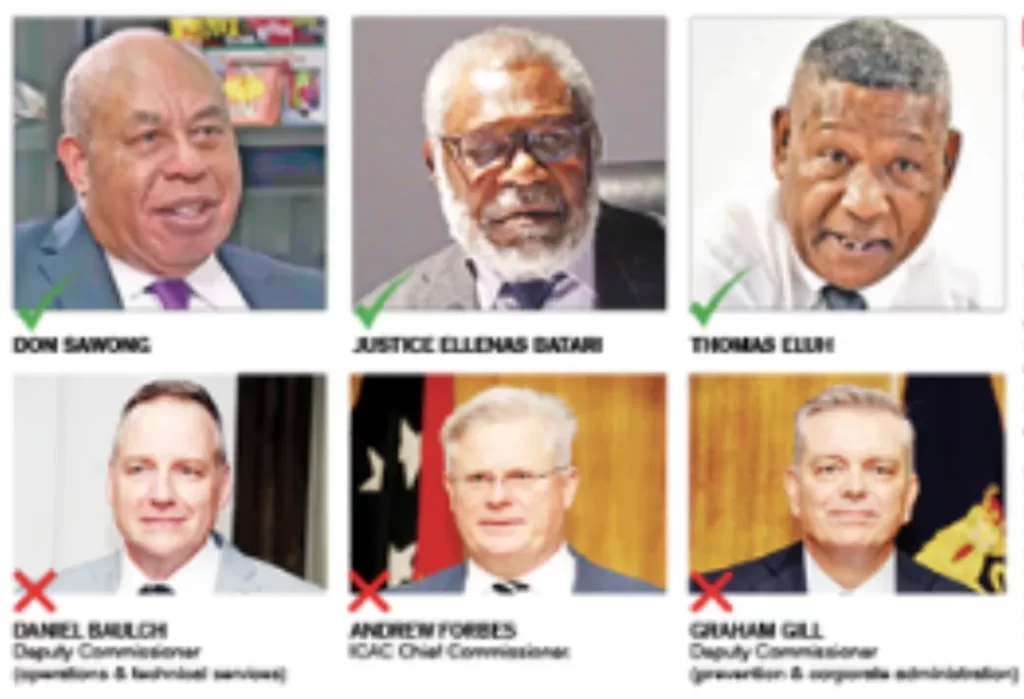The Collapse of PNG’s ICAC Reveals Deeper Issues of Governance and Local Relevance
Papua New Guinea’s Independent Commission Against Corruption (ICAC) has all but collapsed, triggering a wave of public concern and reflection on the nation’s long-standing struggle with corruption.
According to the Government Gazette published on June 20, all three core foreign commissioners—Chairman Andrew Forbes, and Commissioners Daniel Baulch and Graham Gill—have been suspended, effectively rendering the two-year-old institution defunct. Once heralded as a key pillar in the nation’s effort to cleanse corruption and restore public trust, ICAC has now crumbled into a cautionary tale of misplaced expectations.
Touted as a “miracle cure” for systemic corruption, ICAC had strong backing from Western consultancy firms and international aid agencies. Yet, it failed to produce any significant results—no successful prosecutions, just one symbolic arrest, and millions of kina in expenses.
The root cause of this failure goes beyond the typical challenges of reform. It represents a profound institutional breakdown, driven largely by internal power struggles and personality conflicts among the foreign leadership. Shockingly, the three commissioners ended up accusing each other of criminal conduct, ultimately leading to their joint downfall.
From its inception, ICAC was plagued by structural misalignment with PNG’s political and cultural realities. The three foreign commissioners—experts in law, intelligence, and policing from Australia and New Zealand—may have brought technical know-how, but lacked the nuanced understanding of PNG’s tribal dynamics, political landscape, and deep-seated social structures. In practice, ICAC became a distant, disconnected body—divorced from the people, the system, and the results it was meant to deliver.
Since independence in 1975, corruption has permeated nearly every level of PNG’s governance—from national politics to local administrations. The late former Prime Minister Sir Mekere Morauta once likened corruption in PNG to an octopus, its tentacles spreading across all corners of the state.
Corruption is estimated to cost PNG over 1 billion kina annually—a loss borne by the country’s most vulnerable. Families in remote areas live without roads, clean water, or access to basic healthcare—not due to a lack of resources, but because those resources are systematically stolen.
ICAC’s collapse is more than a failed reform—it’s a national embarrassment and a wake-up call. It exposes the fallacy that foreign-designed institutions can be parachuted into complex, post-colonial societies and produce instant results. PNG’s governance challenges are deeply rooted, and the solutions must emerge from within.
Anti-corruption is not a trendy slogan, nor should developing nations serve as laboratories for Western NGOs to test governance models. What PNG truly needs is an anti-corruption framework that is grounded in local realities—driven by Papua New Guineans who understand the intricacies of their own society, and built on the rule of law, grassroots support, and political resolve.
Real reform requires more than foreign consultants and outsourced reports. It needs a homegrown movement, steered by legal professionals with credibility, backed by a clear institutional mandate, and fueled by the people’s will.
To break the vicious cycle of corruption – poverty – disillusionment, PNG must sever the tentacles of the corruption octopus, and begin a true renaissance in governance—one that is indigenous, inclusive, and irreversible.
The downfall of ICAC is both a mirror and a warning. It reminds developing nations everywhere: there is no one-size-fits-all in governance. Imported systems must be tailored to fit the local body politic. And above all—anti-corruption cannot rely on outsiders. It must come from within.


